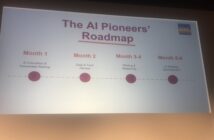Only three out of 10 organisations are achieving improved productivity and engagement from their L&D initiatives, only 2 out of 10 have seen improvements in the learning culture of the organisation and only 4 out of 10 are achieving increased efficiency as a result of their training strategies, according to the 2015 Towards Maturity Benchmark Study.
Published today, the report includes data provided by more than 600 L&D professionals in 55 countries and inputs from 1,600 learners. The Report explores the lessons that L&D leaders can learn from the top performing learning organisations.
Despite L&D teams desire to provide services that will have a significant impact on business agility, organisational and individual performance, this is not happening for most. Where it is happening, L&D is having a big impact on both business and individual performance. Top Deck organisations, those in the top 10% of the Towards Maturity Benchmark Study, report improvements in productivity (12%), employee engagement (21%) and a reduction in costs (16%).
Their approach to learning is also fundamentally different, moving away from the delivery of courses to finding new ways of supporting learning and performance in the heart of the workplace. The majority of Top Deck organisations (94%) consider the course to be just one option for building skills (53% average) and 86% adopt approaches that support learning in the flow of work compared to 47% on average.
Laura Overton, Managing Director of Towards Maturity, said: “This year’s Benchmark Report has discovered that L&D teams of Top Deck learning organisations have clear working partnerships with the line of business. Compared to the average, they are twice as likely to identify key performance measures that are important to the business and to have a plan in place to meet those goals. Their management teams are twice as likely to assign board level accountability for learning and 90% expect managers to take responsibility for the learning of their staff. This close working partnership means that L&D are in a position to apply innovative solutions that deliver an appreciable contribution to the bottom line.’’
Top Deck Learning teams are not only working in meaningful ways with business leaders, they are also have a consumer driven approach to supporting staff with 86% of Top Deck learning teams reporting they are proactive in understanding how their learners learn (30% on average), 76 percent involving staff up front in learning design (35% average).
Key challenges for L&D leaders are, in Europe, a lack of L&D teams’ skills; a lack of management buy-in to L&D (in Australia), and a reluctance by L&D professionals to engage with technology (in the Middle East and India).
“In the face of these – and other – challenges, many L&D professionals appear to be shy of using data and evidence to inform their decisions,” Laura said. “Currently, only 16 per cent of L&D practitioners are using learning analytics to improve the service they offer – and only ten per cent actively use benchmarking as a performance improvement tool.



